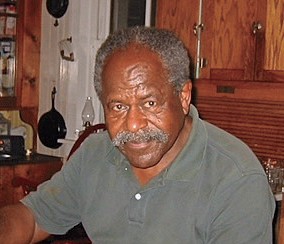Donald Bernard Gibson, 90, of Princeton New Jersey died peacefully at his home in Princeton, NJ on November 18, 2023. He is survived by his partner Linda Fitch, his former wife JoAnne Gibson, his sons David and Douglas, and grandchildren Olivia, Harrison, and Mia. A service of remembrance and a reception will take place at the Unitarian Church of Princeton at 2:00 PM, Saturday, January 6, 2024.
Donald Gibson was born in Kansas City, Mo on July 2, 1933 of Oscar J. and Florine C. Myers Gibson. He received his Bachelors and Master’s Degree from the University of Missouri in Kansas, and his Ph.D. from Brown University. He taught at Wayne State, the University of Connecticut, Brown University, Harvard and Rutgers. In 1972 his Twentieth-Century Interpretations of Modern Black Poets was published. In 1974, He was on the editorial board of the Black American Literature Forum. He retired from Rutgers in 2001.
Professor, author, and critic, during his lifetime a particularly notable achievement was his creation of a university course previously unknown in most colleges, that of African American literature. During 40 years of teaching and scholarship, and through his books, essays, articles, and public lectures, Gibson helped to establish the study of literature created by black writers as a legitimate university course.
As he has written, “When I was a student, during the 1940s and 1950s, Kansas City was entirely segregated, and so all of my teachers, the school staff, and even the janitors that I knew, were black. My teachers took the time to teach us about black history, black literature, and black culture. The whole effort of the system and of our teachers was to prepare us to attend college and to be successful there.”
By the time he completed high school in 1951 the University of Kansas City was becoming integrated and Gibson was invited to apply. As an undergraduate Gibson found that for the first time he was a member of a minority group in school. His teachers, along with most of his classmates, were white.
Though an exemplary graduate student at Brown (as he had been in schools throughout his education), superior grades and strong recommendations did not lead to many job offers for black scholars. He once wrote, “It was 1962, Segregation and some of the first rumblings of racial unrest resulted in limited job opportunities for black men, even well educated black men. I was finally hired as an assistant professor at Wayne State University in Detroit, Michigan.”
In 1967 Gibson took a position as an associate professor at the University of Connecticut where he was actually encouraged to teach classes in African American literature. During the late 1960s and early 1970s he published several articles including Ralph Ellison’s Invisible Man, Native Son and the Tyranny of Social Convention by Richard Wright and The Politics of Literary Expression: A Study of Major Black Writers (Contributions in Political Science). In 1970, Gibson was awarded a study grant from the National Endowment for the Humanities and a research grant by the American Council of Learned Services. He also accepted an appointment to the editorial board of the Langston Hughes Society Journal.
At the same time, Gibson edited two books. The first was a collection of essays, Five Black Writers: Essays on Wright, Ellison, Baldwin, Hughes and LeRoi Jones published in 1970 by New York University Press. The second, Black and White: Stories of American Life, was a collection of short stories by W.E.B. Du Bois for which he wrote the introduction, edited with Carol Anselment and published in 1971. Other essays included “Is there a Black Literary Tradition? (1971), Ralph Ellison and James Baldwin (1971), and The Good Black Poet and the Good Gray Poet (1971).
Not only was Donald a distinguished academic – he was a man of many interests and talents. He loved singing and was an excellent tennis player well into his 80s. He was a carver of wood and a talented and creative cook.
In retirement his travels took him to Senegal and South Africa where he lectured at local universities. His final years were spent in both Princeton, New Jersey and Isle La Motte Vermont with his partner, Linda Fitch.
Gibson’s legacy will live on as a notable scholar of African American literature, distinguished, by his introduction to the world, of some of the great writers of our time. He will be deeply missed by family and a host of friends and colleagues.

